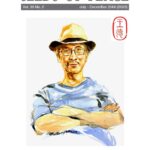In the Theravada tradition, we begin counting our era with the time of the Mahapranibbana of the Lord Buddha. The
Sri Lankan, Burmese and Indian Buddhists count one on the day of the Master’s passing away. The Siamese, however,
regard the first anniversary of the great event as B.E. 1. Hence the 2500 years of the Buddhist Era was celebrated in
Ceylon, Burma and India in 1956 of the Common Era, while in Siam the great celebration took place in 1957.
Modem scholars question the traditional Buddhist Era. Edward Conze, for example, argued that the Buddha
passed away 480 years before Christ-not 543. Son am Marup’ s The Date of The Buddha’s Mahaparinirvana ( 1990)
states precisely that it took place in 487 B.C. These are only two diverging points. The Chinese, Tibetans, etc., count
their Buddhist Era differently. For example, the Tibetan calendar regards this year as 2138. In fact, there was a
council of contemporary scholars on Buddhism which met in Germany some years ago. They wanted to achieve a
unanimous agreement on the Buddhist Era, but failed. Practising Buddhists however do not take dates, places, eras,
etc., very seriously. For instance, in every sermon in Siam, before the Bhikkhu begins to preach, he would say
something like this: “Today is Monday on the new moon in the lunar calendar and 15 January in the solar calendar.
T
he year since the Master’s Great Passing is 2555. Listeners should be mindful that everything is impermanent. He
or she should practise the teaching of the Buddha for his of her final liberation from hatred, greed and delusion.”
In 1956 the Indian government celebrated the 2500 years of the Buddhist Era in a magnificent manner. The Dalai
Lama and the Panchen Lama were invited as chief guests of an international gathering and pilgrimage. The Indian
Buddhists regarded last year as the 2600th anniversary of the Great Awakening of the Buddha, and the government
oflndia gave a lot of financial support to the Ashoka Mission to organize the Global Buddhist Congregation 2011 in
New Delhi (held during 27-30 November), which was followed by a Buddhist pilgrimage. The government itself did
not host the GBC.






